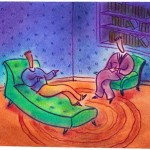Published: January 23, 2009

© Getty Images
Stacey Rosenberg, a former marketing manger in Boston, knows the catastrophic feeling of a layoff. She has lost her job twice in the midst of the recession.
“When I first got laid off, I sort of had a mission. I wanted to get a new job as quickly as possible, and when it became apparent that that was not going to happen very quickly, it was very upsetting for me,” Rosenberg says.
Unemployed for months, Rosenberg started retreating from friends and family, spending more time by herself. Since early summer, she’s sought help inside a psychotherapist’s office.
“I had to figure out how to deal with it the second time around, because I did so poorly the first time around,” she says.
No formal data exist on the number of Americans who are turning to therapy during the recession, but most clinical psychologists say that referrals are up.
“This is really unprecedented,” says Nancy Molitor, a clinical psychologist in Chicago, Illinois. “I’ve been practicing for 20 years, and I’m seeing just an unprecedented amount of anxiety, as are most of my colleagues.” Click to continue reading
Source: CNN
Published: January 23, 2009

Image Credit: iStockphoto
UK and US researchers looked at 2,000 people aged 65 and over.
They found that compared to those with the highest vitamin D levels, those with the lowest were more than twice as likely to have impaired understanding. Alzheimer’s charities said the research was interesting, but more work was needed to understand vitamin D’s role. [continue reading…]
Published: January 22, 2009
Intuitively we sense that nature relaxes us — even small pockets of green in the concrete urban jungle seem to make a difference. But finding good scientific evidence for how and why has been more difficult — until now. Crime rates, academic performance, aggression and even ADHD. Could a bit of greening make all the difference? And, ecology on the couch — a self described ‘ecotherapist’ with novel techniques.
 Â Listen Now Download Audio
 Listen Now Download Audio
Source: ABC All in the Mind
Published: January 22, 2009
When Dr Anne Turner chose to end her own life in a Swiss clinic it was front-page news.
The retired doctor had a degenerative neurological condition called progressive supranuclear palsy (PSP).
She knew she faced a slow death, becoming less and less able to communicate with her carers and loved ones.
This weekend her story ‘A short stay in Switzerland’ is brought to the small screen by award winning writer Frank McGuiness and starring Julie Walters, as Anne. Click to continue reading
Source: BBC


